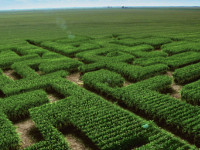Russia is infected with genetically modified seeds
The Russian Federation is going to tighten the legislation on GMOs. It was proposed to ban the import into Russia of products containing GMOs. Prime Minister Dmitry Medvedev instructed the relevant agencies to develop specific proposals on this issue by October 15. Pravda.Ru discussed the danger of GMOs and genetically modified products with experts.

Despite the criticism, Russia currently has relatively stringent legislation on GMOs (only the EU has stricter legislation, with the United States and Canada being the most liberal in this regard).
For example, in Russia producers are required to specify the information on GMOs on the labels. The import and use of GMO seeds on the territory of Russia is also prohibited. The issue of genetically modified seeds and the use of genetic engineering in agriculture is cornerstone and strategically important.
Despite the fact that the import of seeds of agricultural crops to Russia is prohibited, violators are finding loopholes in the Russian legislation on GMOs. Alexei Alekseyenko, the deputy of the Federal Service for Veterinary and Phytosanitary Surveillance, talked about it with Pravda.Ru.
"In Russia the import of genetically modified seeds is banned, but there is a danger of its illegal importation. There is a risk of GMOs spreading further into the Russian populations that are not genetically modified.
According to our information, recently quite a large batch of seeds of genetically modified crops was brought to Odessa, and there are attempts to smuggle these seeds into Russia in small batches. The seeds are registered as a food grain or as not genetically modified. That is, there is an urgent need to take very serious action on a national scale.
The seriousness of the problems with genetically engineered seeds was confirmed by head of the National Association for Genetic Security Elena Sharoikina: "Though sowing of genetically modified seeds is not allowed in Russia, no one ever checked agricultural fields, so no one knows for sure whether GMO seeds are planted. In this regard our association began agricultural GM-monitoring. These are independent control checks for the presence of GMOs in Russian fields. To date, we have managed to check the fields in the Belgorod region. GMO was not found, and we checked different varieties of corn and soybeans."
There are some problems (and not only in Russia) with control not only of seeds for agriculture, but also the control of finished products that may contain GMO, as well as farm produce. To keep track of all of this, we need many special laboratories, professionals, and a robust control system. "There were cases, and quite numerous, when modified components were found in products that were supplied as non-genetically modified. First, there was a big scandal in New Zealand in the beginning of 2000s, when a large batch of allegedly hybrid corn was supplied there from the U.S. During tests, foreign gene constructs were found in the corn. It also has to do with the fact that there is a constant antigenic drift in nature, and genetic material of modified organisms penetrates the population of non-modified ones," Alexei Alekseyenko told Pravda.Ru.
Despite the fact that in the minds of the majority a single image of GMOs has been formed, the picture is not that unambiguous. Experts even say that there are more dangerous and less dangerous GMOs (although the overall negative component is not denied. Many recent studies, including Russian ones, speak about the health dangers of GMOs):
"I'll talk about vegetable products. Foreign genes are introduced into the genome so that the plant starts to produce certain substances that, for example, repel pests, or reduce their dependence on herbicides and so on. That is, gene structures vary greatly.
If a plant begins producing its own herbicide, it means that this herbicide will get into our body when we eat the plant. Other gene constructs are less dangerous to the consumer, and some are even more dangerous because they were injected genes to turn these crops into technical ones so they produce a substance that will show up during the production process. Such plants are not intended for consumption. But due to the horizontal drift of the genetic structure of genes other populations are also exposed to it," Alekseyenko said.
The Chairman of the Board of Directors of "Dymov" company Vadim Dymov agreed with this observation:
"GMOs have negative traits and also positive traits, but unfortunately, the public generally is aware of the negative side, and this might be right. GMO restricting will benefit both the economy and, most importantly, the consumer society, because the most important thing is the safety of consumer products, and not the interests of the industrial and financial groups, so I support the decision of the Russian authorities.
Genetic engineering is especially dangerous in agriculture. Soy that is often cited as an example of a plant with genetically modified code is nothing compared to some other examples. Potatoes with a scorpion gene are much more serious business."
Subscribe to Pravda.Ru Telegram channel, Facebook, RSS!

